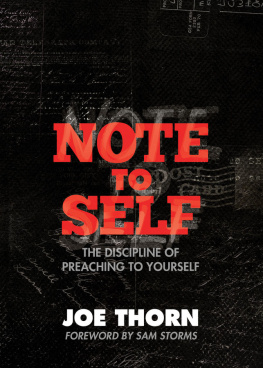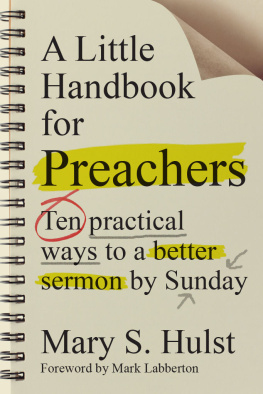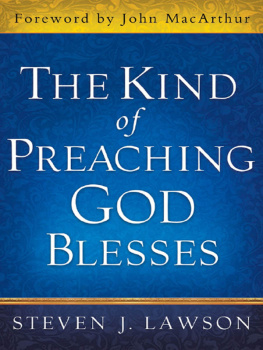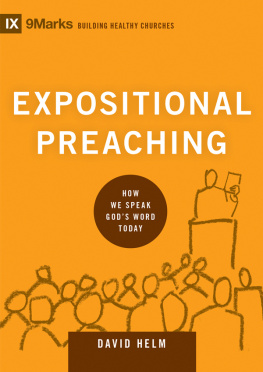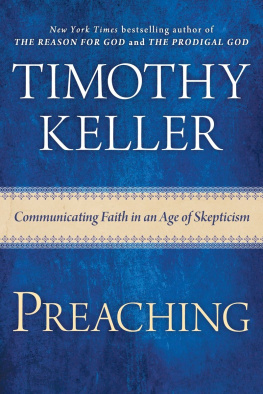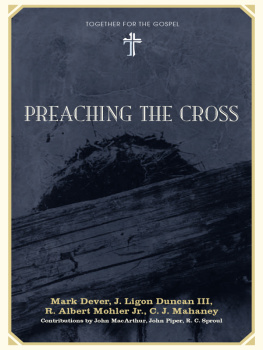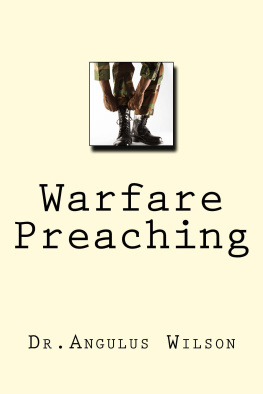Thank you for downloading this Crossway book.
Sign-up for the Crossway Newsletter for updates on special offers, new resources, and exciting global ministry initiatives:
Crossway Newsletter
Or, if you prefer, we would love to connect with you online:
Facebook
Twitter
Google +
Note to Self: The Discipline of Preaching to Yourself
Copyright 2011 by Joe Thorn
Published by Crossway
1300 Crescent Street
Wheaton, Illinois 60187
All rights reserved. No part of this publication may be reproduced, stored in a retrieval system, or transmitted in any form by any means, electronic, mechanical, photocopy, recording, or otherwise, without the prior permission of the publisher, except as provided for by USA copyright law.
Cover design: Patrick Mahoney of The Mahoney Design Team
First printing 2011
Printed in the United States of America
Scripture quotations are from the ESV Bible (The Holy Bible, EnglishStandard Version), copyright 2001 by Crossway. Used by permission. All rights reserved.
Scripture quotations marked nasb are from The New American StandardBible. Copyright The Lockman Foundation, 1960, 1962, 1963, 1968, 1971, 1972, 1973, 1975, 1977, 1995. Used by permission.
All emphases in Scripture quotations have been added by the author.
Trade paperback ISBN: 978-1-4335-2206-2
PDF ISBN: 978-1-4335-2207-9 Mobipocket
ISBN: 978-1-4335-2208-6
ePub ISBN: 978-1-4335-2211-6
Library of Congress Cataloging-in-Publication Data
Thorn, Joe, 1972
Note to self : the discipline of preaching to yourself / Joe Thorn.
p. cm.
ISBN 978-1-4335-2206-2 (tpb)
1. Meditations. 2. Christian life. II. Title.
BV4832.3.T49 2011
2010040122
248.3'4dc22
Crossway is a publishing ministry of Good News Publishers.
VP 21 20 19 18 17 16 15 14 13 12 11
13 12 11 10 9 8 7 6 5 4 3 2 1
One of the annoying things about forewords to books is how they so often simply repeat, in only slightly different terms, what the book itself says. That really doesnt help anyone, so I wont spend time saying in fewer words what Joe Thorn says so well in the pages that lie ahead. Let me take this opportunity, instead, to say something about why this book is worth the investment of your time and energy.
Contrary to what you may have concluded when you read the title and subtitle of this book, it is not an exercise in narcissistic introspection. This book is not an invitation to some weird form of spiritual navel-gazing as if the answers to your questions or the solutions to your problems are on the inside, somewhere in the depths of your soul. They are, in fact, on the outside. They are found not in what you do or feel for God, but in what God has graciously done for you. They are not found in your future accomplishments but in his past achievement in the life, death, and resurrection of Jesus Christ. This is, in fact, the most important note to self that Joe could possibly communicate.
This book is written on the heartfelt assumption that the truth of Gods written Word is unparalleled in its capacity to change a human life. What ultimately accounts for the sort of transformation that we prize and that pleases God is the truth of Scripture inspired, illumined, and applied to the human soul. Good intentions, New Years resolutions, promises, plans, personal discipline, and rigorous regimens designed to control and direct human choices only go so far. They rarely, if ever, effect a lasting and fruitful change in the soul. It is only when our thoughts are challenged and conformed to the principles of Gods Word and our hearts are energized to make choices consistent with Gods revealed will that a human being is transformed. Joes book is grounded in this truth.
What Im talking about, and what this book so beautifully portrays, is the functional authority of Scripture in the life of a believer. Merely affirming that the Bible is inspired accomplishes very little. Asserting its authority isnt much better. The inspiration and authority of the Scriptures are of value to us only so far as we change our beliefs to conform to its principles and alter our behavior to coincide with its imperatives. The Bible is meant to govern our lives, to fashion our choices, to challenge our cherished traditions, and ultimately to make us look more like Jesus. The question for each of us, then, is whether the Bible actually functions in this way. Do we submit to its dictates? Do we put our confidence in its promises? Do we stop living a certain way in response to its counsel? Do we embrace particular truths on its authority? Do we set aside traditional practices that conflict with its instruction? In other words, for the Bible to be of value to us it must actually function to shape how we think, feel, and act, as well as what we believe, value, and teach.
Reading Note to Self will challenge you in precisely this way. It is a no-holds-barred appeal to expose our lives to the searing searchlight of Scripture and to let its voice speak to the way we formulate our beliefs and relate to other people and think about God and make choices in the course of daily life. If you are not yet persuaded that Scripture has been invested with this sort of power, perhaps you should consider a few relevant texts before you immerse yourself in Joes wise counsel.
Consider how this is articulated by the apostle Peter in his first epistle. He declares that we have been born again, not of perishable seed but of imperishable, through the living and abiding word of God (1 Pet. 1:23). This, says the apostle, is Gods Word, not mans word, not human speculation, but the transcript of divine speech. We would be in an utterly helpless, hopeless, and spiritually pathetic condition if left to our own thoughts and agendas and wisdom. Paul applauded the Thessalonians because when you received the word of God, which you heard from us, you accepted it not as the word of men but as what it really is, the word of God, which is at work in you believers (1 Thess. 2:13).
This word, says Peter, so ably interpreted and applied in Joes book, is imperishable (1 Pet. 1:23). This notion of something being imperishable is profoundly important to Peter as he earlier declared that our heavenly inheritance is imperishable (that is to say, not subject to corruption or decay or defilement; 1:34). Again in chapter one of his epistle, Peter affirms that the ransom price by which we are set free from sin, the blood of Christ, is imperishable (unlike silver and gold; 1:1819). Now here in 1 Peter 1:23 he affirms that the divine instrument by which we are born again is an imperishable seed, namely, the Word of God. It is imperishable as contrasted with the grass and flowers that blossom for a season but soon fade away and lose their capacity to enthrall us or satisfy us, both physically and aesthetically. The written Word and the gospel it proclaims will never die or suffer decay, notwithstanding the objections thrown at it by critics and Christ-deniers.

